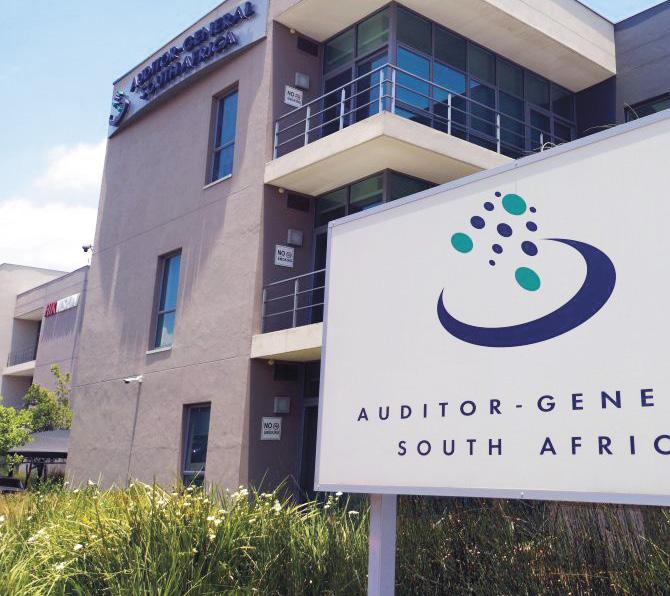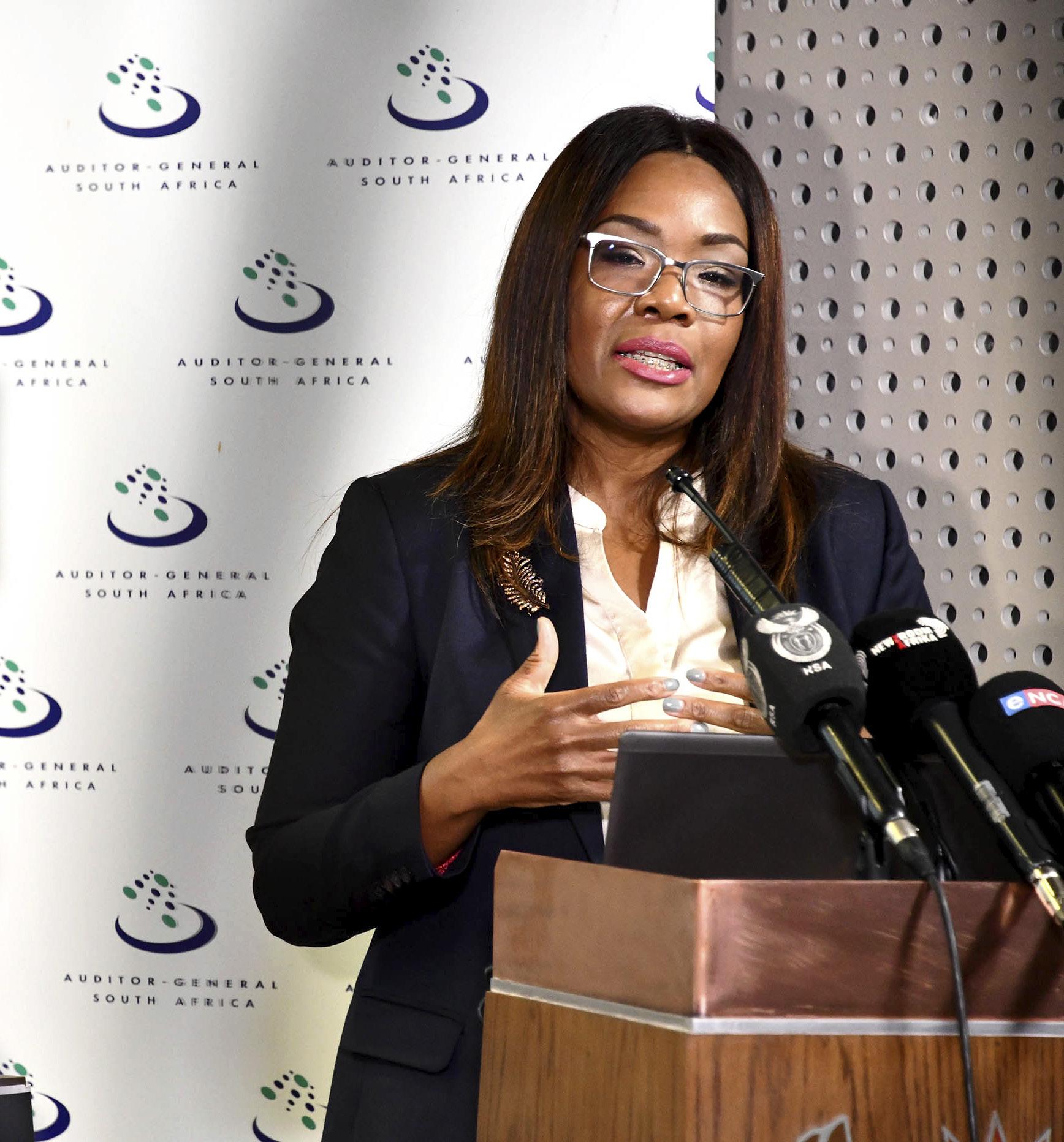
15 minute read
2019-2020 Municipal Audit Outcomes
by kwedamedia
Four months before the 2021 local government elections scheduled for 27 October, AuditorGeneral(AG) Tsakani Maluleke tabled a consolidated general report on the local government audit outcomes for the 2019-20 financial year - a full year after the completion of the financial year under review.
Advertisement
In tabling the report, the AG emphasised that the progressive and sustainable improvements required to prevent accountability failures, or to deal with them appropriately when they do occur, do not exist.
“Audit results under the outgoing administration have demonstrated little sign of improvement and we have observed the deteriorating state of local government. When it took over, the administration inherited 33 clean audits. Unfortunately, it has now regressed to only 27 clean audits. We therefore call on leadership to embrace their responsibility to drive change if we are to make a difference,” says Maluleke.
Impact of COVID-19
The Minister of Finance granted local government a two-month concession on the deadline to submit financial statements, which severely affected the AGSA’s normal audit processes and timelines. In addition, the AGSA performed a real-time audit at the same time as the normal audits and the unavoidable challenges of auditing during a pandemic further contributed to the audits running into April 2021.
Reflecting on the 2018-19 report
In the previous financial year, the AG delivered a very direct message that local government finances were under severe pressure and were not being managed as they should, and warned that short-term solutions were not going to bring about the change needed and were often both costly and ineffective.
The following solutions were put forward:
• Investing in preventative controls, which is more effective than having to deal with the impact of accountability failures, including financial loss, fraud and corruption, the misuse of public resources, and service delivery failures.
• Significantly improving monitoring, review and oversight by senior officials, municipal leaders and councils.
• Using our reports, briefings and engagements to identify key areas that need attention and would benefit most from implementing preventative controls, such as our status-of-record reviews, which alert municipalities to risks during the year and act as an early warning signal.
• Effecting consequences for accountability failures.
“Unfortunately, we have not seen evidence of these messages being taken to heart,” says Maluleke, “and hence we are reporting that poor audit outcomes remain prevalent, while we also recognise the net improvement year on year.”
State of the 2019-2020 Municipal Finances
AG Tsakani Maluleka revealed that there was R26 billion in irregular expenditure at municipalities in the 2019-2020 financial year. The actual figure can be much higher as the financial statements from some municipalities were not credible, while others did not submit their statements in time for the audit.
The AG emphasised that disciplined financial and performance management is key to achieving improved audit outcomes and service delivery.
She noted that local government finances continues to be under severe pressure as a result of nonpayment by municipal debtors, poor budgeting practices and ineffective financial management. The financial position of just over a quarter of municipalities is so dire that there is significant doubt that they will be able to continue meeting their obligations in the near future. Almost half of the municipalities are exhibiting indicators of financial strain, including low debt recovery, an inability to pay creditors and operating deficits.
The impact of municipal creditors not being paid is well-known and the AG added that “local government loses billions of rands annually because of interest and penalties, which form a significant portion of the R3,47 billion of fruitless and wasteful expenditure reported in 2019-20”.
The AG has expressed concern that after all the years of the AGSA reporting shortcomings and making recommendations, municipalities have still not mastered the basics of financial reporting, with only 28% being able to submit quality financial statements for audit purposes. This highlights prevailing weaknesses in the processes that underpin effective financial management, including those relating to the preparation of the in-year financial reports necessary to monitor a municipality’s budget and expenditure.
The Cost of Municipal Financial Reporting
“The cost of financial reporting has amounted to over R5 billion, based only on the salary cost of finance units and the cost of financial reporting consultants, which accounts for 18% of the total cost. Only 2% of municipalities used consultants to bridge the vacancy gap, while others paid consultants even though their finance units are well capacitated,” explains Maluleke.
What is equally concerning, she adds, is that the use of consultants was not necessarily effective.
64 % of municipalities did not provide adequate records, appointed consultants too late, or did not manage the consultants’ work properly to benefit from their appointment – effectively outsourcing responsibilities.
Disclaimed municipalities
Despite all our previous messages, actions taken by oversight, initiatives implemented by national and provincial departments, and some municipalities even being placed under administration, 22 municipalities had received disclaimed opinions by 4 June 2021. Another four municipalities that had disclaimed opinions in the previous year have not yet submitted their financial statements for auditing.
At least five of the disclaimed municipalities have been under administration for two years or more. Despite this, the AGSA sees a prolonged state of poor performance and therefore remains concerned about the effectiveness of the administration process.
The AG explains that these municipalities received funding during the year in the form of conditional grants and an equitable share of revenue raised nationally to enable them to operate and deliver essential services to the communities they serve. “However, we did not find auditable proof of what was done with the money from the time it was received to account for what was left in the bank at year-end,” she adds. A lack of complete and proper records inevitably leads to unreliable financial reporting during the year and at year-end, which is likely to result in substantial harm to these municipalities and compromise their ability to deliver on their service mandate.
“We therefore notified the relevant municipal managers of 21 material irregularities in terms of the Public Audit Act. In their response, these municipal managers are required to clearly articulate what caused the material irregularity. They must also commit to actions that will prevent any further harm and ensure that there are consequences for those responsible for the dire state of their municipality. If they do not respond appropriately, or do not implement the actions to which they have committed, we will implement remedial action,” Maluleke continues.
The municipalities’ performance reporting was even worse than their financial reporting. It is not surprising that citizens experience poor service delivery from municipalities if less than a quarter of them could provide us with quality performance reports to audit. After addressing the AG’s findings, just under half of the municipalities managed to publish performance information that was reliable.
“We once again observed widespread non-compliance with legislation and reported material noncompliance at 86% of municipalities,” says Maluleke. “As in previous years, non-compliance with supply chain management legislation was prevalent, significantly contributing to the irregular expenditure of R26 billion. This amount is likely to be even higher, as just over a third of municipalities were qualified on the completeness of their disclosure or were still investigating the full extent of the irregular expenditure.”
The AG was also unable to audit contracts worth R1,43 billion as municipalities did not provide the required documentation and evidence to support the procurement processes. At year-end, the cumulative amount of irregular expenditure not dealt with stood at R79,22 billion, which demonstrates that municipalities do not implement consequence management. We call on the incoming administration to address this as a matter of priority. We view this in serious light and will not hesitate to take serious action should the accounting officers not act.

Auditor-General: Ms Tsakani Maluleke
Material irregularities
The poor state of financial and performance management in local government, as evidenced by the audit outcomes, resulted in material financial losses at some municipalities and substantial harm to their ability to deliver on their mandate. The amendments to the Public Audit Act, which came into effect on 1 April 2019, provide the AGSA with the mandate to report on these matters as material irregularities and to take action when municipal managers do not deal with them appropriately.
“In the second year of carrying out our expanded mandate in local government, we significantly expanded our work by implementing the process at fifty-seven auditees, which was a significant increase from the nine auditees that were the subject of our first year of implementation. By 11 June 2021, we had issued notifications for 96 material irregularities against municipalities,” says Maluleke.
A total of 75 of the material irregularities related to noncompliance with legislation that resulted, or is likely to result, in a material financial loss totalling an estimated R2,04 billion. These material irregularities merged in four key areas:
• procurement and payments,
• interest and penalties,
• revenue management,
• and investments and assets
These are all matters that we have been reporting as areas of vulnerability for a number of years, including as part of this year’s audit outcomes. These are not complex issues; rather, they are some of the basic disciplines and processes that should be in place at municipalities, such as procuring at the best price, paying only for what was received, making payments on time, recovering the revenue owed to the state and safeguarding assets.
Good preventative controls would have made all the difference in preventing or detecting these matters before they became so material.
“As mentioned earlier, we identified material irregularities where municipalities received disclaimed opinions. By 11 June 2021, we had issued notifications of these material irregularities to the municipal managers of 21 disclaimed municipalities, because we identified that these irregularities have caused substantial harm to their institutions. As the material irregularity process is continuous in nature and not affected by the audit cycle, we continue to assess the findings from our audits that could potentially be material irregularities,” Maluleke explains. “If confirmed, and once the municipal managers have been notified, we will report on these matters in our 2020-21 reports.”
Based on the responses to the notifications and the actions being taken to resolve the material irregularities reported in the previous year, we can conclude that we are starting to see signs of a behavioural change by most municipal managers towards responding to our findings in a decisive and timely manner. However, there are some instances where we have not seen the required response (as outlined on page 102 of the report). The support of mayors and councils is crucial when it comes to resolving material irregularities, but this is an area where we have not yet observed any significant uptake or commitments.
Provinces
AG Maluleke emphasises that, despite the uniqueness of each province, the need for leadership to step up and turn the tide is transversal. Therefore, we call on provincial authorities to hold municipalities to account.
A call to leadership
AG Tsakani Maluleke emphasises that “the audit office is convinced that if municipal leaders at both administrative and political level, supported by their provincial leadership, are fully committed to turning around local government and moving it towards the capable, efficient, ethical and development-oriented institutions envisaged by the constitution, improvements are bound to follow. We have seen great results where leadership has taken definite strides towards a better future for the communities they serve”.
We encourage councils, Parliament, provincial legislatures, as well as the political and administrative leadership, to play their part effectively to ensure accountability for government spending and improvement in the lives of the citizens of this country. Ethical and accountable leadership should drive the desired change.
Special report on the financial management of local government’s COVID-19 initiatives
At the same time as tabling the general report, AG Maluleke released the results of the real-time audit on local government expenditure on COVID-19-related initiatives.
This is the third special audit report on the financial management of the relief funding government made available in response to the pandemic.

AGSA performed the audit at 43 municipalities that were selected based on:
• the portion of the funding that municipalities were paid – we included all municipalities that had been paid more than R16 million each from the conditional grants allocation by the end of August 2020.
• the top three contributors to irregular expenditure in each province, based on the irregular expenditure incurred for the 2018-19 financial year.
• the municipalities identified through our environmental scanning of media reports, Special Investigating Unit (SIU) reports and Public Protector reports. For the remaining 214 municipalities not selected for the real-time audit, AGSA audited and reported on the use of funds from April to June 2020 as part of the normal 2019-20 audit cycle.
Striking resemblance between the two reports
The AG reports that the findings from the real-time audit her office performed on the COVID-19 initiatives “shows a striking similarity to the Poor outcomes and other findings we are reporting in the 2019-20 general report. The impact of compromised control environments and poor financial and performance management was even more pronounced in the midst of a pandemic, when vulnerable citizens relied on local authorities to keep them safe from harm”. She adds that while emergency response and quick actions were required, these were not supposed to be “at the expense of careful planning and the disciplined execution of controls that prevent transgressions, loss, fraud and project failures”.
Key findings and audit observations at a glance
The municipalities that were subjected to the real-time audit were allocated a combined R14, 4 billion out of the R23,937 billion that was announced for the municipal response to COVID-19. Of this amount, 42% had been spent by 31 March 2021. AGSA made the following observations regarding the funding that had been spent:
• It is difficult to plan and operate in an emergency when sufficient information is not always available and swift action is required. The impact of weaknesses in needs assessment and demand planning were, however, amplified in these circumstances. Where funds were used for quarantine sites and temporary shelters, inadequate planning by some municipalities resulted in the facilities being over or under used.
• Similarly, when it came to providing emergency water and additional sanitation, community needs were not adequately assessed and delivery planned according to those needs.
• The procurement of personal protective equipment (PPE) also bore testament to the haphazard manner in which municipalities responded to the crisis – we found little evidence of proper needs analyses being conducted before procurement took place, resulting in either insufficient or excess PPE being procured.
• Poor workmanship, project delays and non-adherence to infrastructure-related requirements were observed on water and sanitation projects, and on projects related to providing shelters for the homeless. The water tanks were not always filled and, where sanitation facilities were provided, they were not serviced regularly, resulting in the required impact not being achieved.

• When it came to the management, storage and use of PPE, we found that the same deficiencies we previously reported in relation to the education and health sectors were also prevalent at municipalities.
Says Maluleke: “In our report, we once again highlight the significant deficiencies in the procurement and contract management processes, and report on the inadequate controls meant to ensure that payments are only made for goods and services that are delivered at the right time, price and quality. We are particularly concerned about unfairness in the awarding of government business and that sufficient care was not taken to protect against overpricing, as we identified a number of instances where municipalities paid excessive prices for goods and services”.
She adds that municipalities did not respond to the increased risk of fraud in a crisis situation by adjusting their fraud risk management processes and implementing strong preventative controls. As a result, auditors identified irregularities, poor internal controls, and indicators of potential fraud.
Procurement documents not provided
The AG says audits were also frustrated by payment and procurement documentation not being provided for auditing. This is a recurring theme in local government, where our ability to audit is sometimes limited by claims that documents are missing or by a lack of response to our requests. As we did with our first two special reports, we will share our findings, fraud risk indicators (such as those records that were not provided for audit) and data analyses with the Fusion Centre, which has the investigative and law enforcement abilities needed to dig deeper and follow through on these results.
“With few exceptions, municipalities missed an opportunity to display the responsive, caring and ethical leadership required in a time of disaster. When you are responsible for people’s lives, every rand should be spent with care. However, in the midst of the pandemic, municipalities continued to plan poorly and misappropriate the funds made available to them,” notes the AG.
“We are particularly concerned about the municipalities’ inability to produce records to support the current spending as the covid-19 relief spend has occurred recently and therefore it should not be a struggle to produce these documents. We will continue to audit the covid-19 funding as part of our normal annual audit, including at those municipalities not selected for this real-time audit, and will report further observations in our next general report for local government.”

Conclusion – moving towards an improved local government
Maluleke concludes, “Finding and implementing sustainable solutions for the crisis in the municipal landscape should be a common goal for all in local government. The relevant role-players should work together to strengthen the capacity, processes and controls of municipalities, which will enable credible financial and performance reporting, compliance with key legislation, sound financial management, and improved service delivery. As the audit office, we are committed to continuing to play our part in improving local government audit outcomes”.
We reiterate our message that “ethical and accountable leadership should drive the required change”, and we call on the incoming leadership to take this message to heart if they aim to realise improved outcomes.










